Recently, a plethora of (mostly liberal) news outlets have jumped on Bernie Sanders for promising that "at the end of my first term we won't have more people in jail than in any other country." Slate called Sanders "delusional." Mother Jones said his plan "doesn't add up." Vox suggested his goal was "impossibly ambitious." Chelsea Clinton called it "worrying."
Bernie himself did not give a target number for the prison population, but the negative assessments are based on a simple calculation: America incarcerates 2.3 million people and China, the world's second biggest jailer, has locked up about 1.66 million. Therefore, they assume that Bernie is planning to free around 600,000 prisoners in 5 years. The problem, the journalists point out, is that only 200,000 of the US's 2.2 million prisoners are in federal prison. Since the President has relatively little control over inmates in state prisons and local jails, Bernie could not possibly keep his promise. Slate's Leon Neyfakh suggests that: "If Sanders wants to release more than 500,000 people by 2020, he's going to have to break them out personally. If he has a more efficient approach in mind, he needs to share it before he makes this ridiculous promise again."
Yet, Neyfakh and his compatriots should hold off on the ridicule. Although the World Prison Brief does provide an estimate of 1.66 million prisoners in China, there is a major caveat: "in addition to the sentenced prisoners, more than 650,000 were held in detention centers in China [as of 2009]. If this was still correct in mid-2014 the total prison population in China was more than 2,300,000."
So, US and Chinese prison statistics are actually pretty comparable. In the US, about 1.26 million people are in state prisons with another 196,000 people in federal prison. That means the US prison population of 1.47 million is actually a little smaller than that of China, which has around 1.66 million people in its Ministry of Justice prisons. Then there are those locked up in jails, generally people awaiting trial or serving a short sentence. In the US that would add about another 745,000 inmates, raising the total to just over 2.2 million. The equivalent number in China is unknown. But, in 2009 China reportedly had 650,000 in its detention centres, so the Prison Brief's estimate of 2.3 million is not a bad place to start.
As someone who studies China's legal system, I should point out that the number of people in detention in China might be smaller now than in 2009. This is because Beijing has made an apparently serious effort to bring an end to the, previously commonplace, form of administrative detention known as Re-education Through Labor (RTL). Nevertheless, many RTL centers continue to function after being rebranded as drug rehab centers. Alleged prostitutes have been sent to "custody and education centers". Political dissidents and Falun Gong practitioners tend to end up in extra-legal "black jails," "legal education centers," or psychiatric facilities.
Estimated Incarcerated Population by Type, China and US in 2015
Sources: World Prison Brief, UN Human Rights Council, Yardley (2005), Seymour (2005).
We can do some back of the envelope calculations to estimate the total population in non-prison detention in China. If we 1) trust estimates that RTL held 190,000 people in 2009, 2) assume that the RTL's drug users (approx. 33%) and political prisoners (approx. 7.5%) are still in detention in some form and that 3) the rest of the detention system has followed the prison population in a slight (approx. 2%) decrease, then perhaps 526,000 people are non-prison detention. This means a rough estimate of 2.18 million Chinese behind bars. Following these estimates, President Bernie would only need to reduce the prison population by a, very doable, 20,000 to fulfil his promise.
Frankly, all of this is a bit silly. Sanders may well have not considered the exact numbers and given the opacity of Chinese detention statistics we would probably never really know if he was able to keep his promise or not. Additionally, absolute numbers of inmates is probably a less-useful statistic than the per-capita incarceration rate. Nevertheless, prison reform and reducing America's sky-high prison population is clearly a worth goal, which has finally achieved some level of bipartisan support. Making a poor statistical assumption to make Bernie's support for prison reform look delusional seems unnecessary at best and malicious at worst.
There is a more fundamental issue at play, however, and one that is close to my heart as a Comparative Political Scientist. American political discourse needs to recognize that politics and policy is as diverse and complex in rest of the world as it is in the US. Bernie suggests the US could learn from Scandinavia. Trump assures us that "China is laughing at us". Hilary says "America is the only country in the developed world that doesn't guarantee paid leave." Cruz claims that "socialized medicine is a disaster" in the countries that have it. Such statements should be carefully analyzed with full consideration given to the complex realities that exist in other countries. This means, of course, that journalists, pundits, and voters might need to bone up on the rest of the world. But this would be a good thing. The United States may be unique in many ways, but it is not so different that is cannot learn from other countries.
One final thought: there have been many delusional promises made on the campaign trail this season, so let's reserve the label for those that really deserve it.
